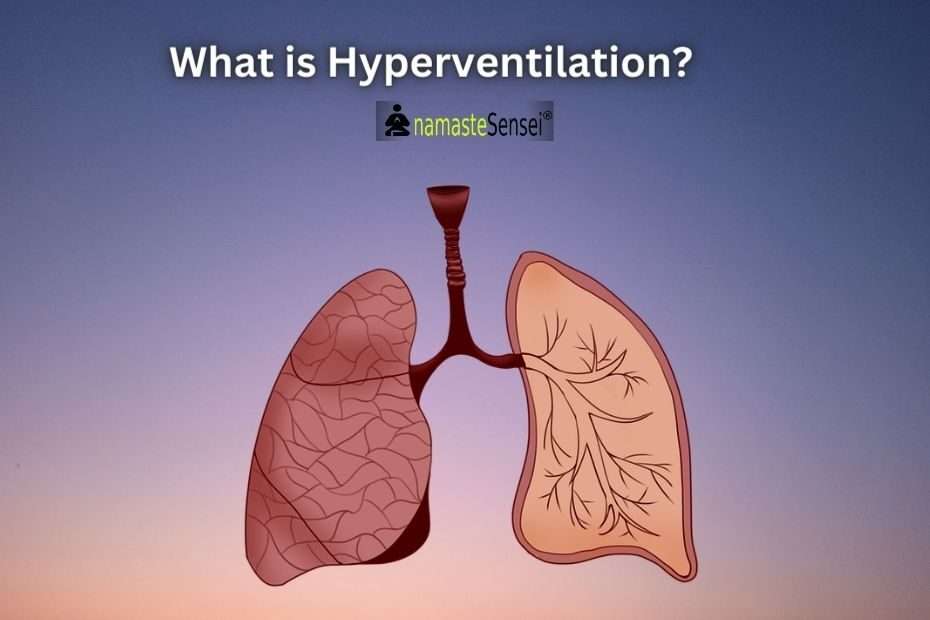Hyperventilation Definition | What is Hyperventilation In Biology?
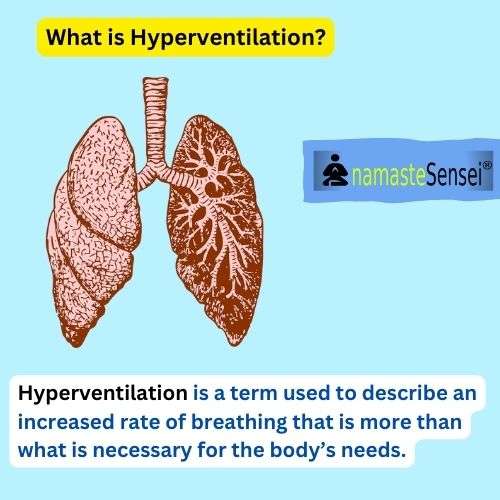
Have you ever heard of the term hyperventilation and wondered What is hyperventilation in biology? It is a term used to describe an increased rate of breathing that is more than what is necessary for the body’s needs.
It can occur suddenly or over a period of time and is a medical condition that can be both serious and uncomfortable. In this blog post, we will explore hyperventilation definition, causes, treatment, and more.
Hyperventilation Definition
It is the process of taking in more air than is necessary for the body’s needs. It usually happens because of increased breathing rate, deeper breaths, or both.
During hyperventilation, the body receives more oxygen than it can use, resulting in an excess of carbon dioxide being expelled from the lungs. This can lead to symptoms such as dizziness, chest pain, numbness and tingling in the hands and feet, and shortness of breath.
Fear, panic, or stress can trigger it, but can also occur with physical exertion, high altitudes, and certain medical conditions.
People with asthma, COPD, and other respiratory issues may be prone to it. Treatment for it typically includes slow, deep breaths and relaxation techniques to help manage stress.
What are the Symptoms of hyperventilation?
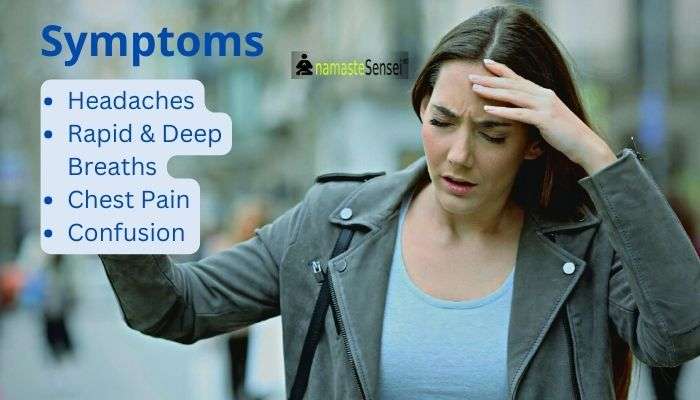
- The most common symptom of hyperventilation is rapid and deep breaths, which may cause the person to feel lightheaded or dizzy.
- Other symptoms include difficulty concentrating, confusion, headaches, chest pains, palpitations, muscle spasms in the hands and feet, trembling or shaking, feelings of panic and fear, and tingling in the fingers or lips.
- In some cases, an individual may even faint or pass out. The body causes these symptoms by not getting enough oxygen and too much carbon dioxide being released.
When someone is hyperventilating, their breathing rate may increase to 20 to 30 breaths per minute, compared to the average of 12-16 breaths per minute. This causes the body to expel more carbon dioxide than it takes in, leading to the symptoms described above.
If you think you are experiencing any of these symptoms, it is important to consult your doctor right away. It can be serious and should not be taken lightly. Treatment typically involves the use of calming techniques, such as slow deep breathing exercises and relaxation techniques.
What are the Causes of hyperventilation?
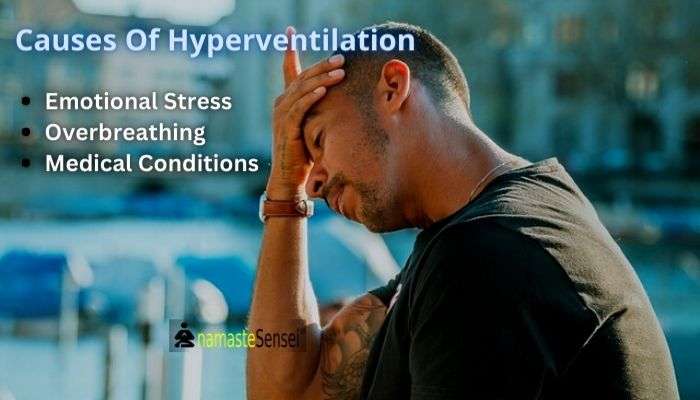
Emotional Stress
Emotional stress usually causes hyperventilation, such as fear, panic, or anxiety. Pain, physical exertion, or other medical conditions can also cause it.
Over-Breathing
One of the most common causes of it is over-breathing or breathing faster and deeper than necessary. This can happen when someone is feeling overwhelmed and their body responds by automatically increasing their breathing rate.
In addition, exercising too strenuously can lead to hyperventilation, as the body requires more oxygen than usual.
Medical Conditions
It can also be caused by certain medical conditions and medications. Stimulant drugs, such as caffeine and nicotine, can increase breathing rate, as can conditions such as asthma or anemia.
Sometimes, people may experience episodes of hyperventilation for no apparent reason. This is known as idiopathic hyperventilation and usually lasts for only a few minutes. The such type occurs in the evening and is accompanied by dizziness, chest tightness, and tingling in the hands and feet.
It can be very dangerous and can lead to lightheadedness, fainting, and even seizures. If you experience any of these symptoms, seek medical help immediately.
hyperventilation in pregnancy
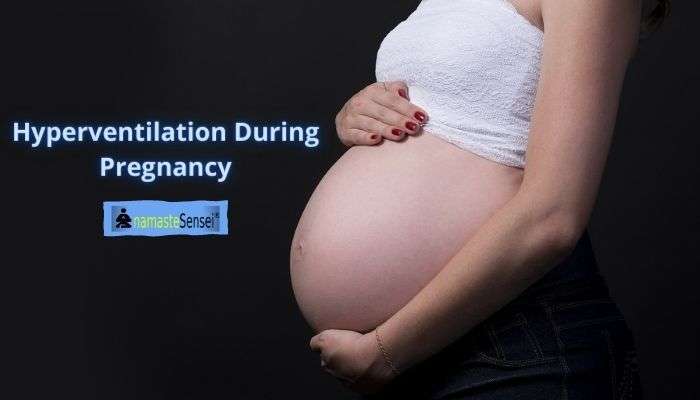
A disruption in the balance of oxygen and carbon dioxide causes hyperventilation in the blood. During pregnancy, increased levels of hormones, such as progesterone, can further disrupt this balance and cause this condition. It is most common in the second and third trimesters of pregnancy.
What is hyperventilation syndrome?
This syndrome is a medical condition that causes an abnormally rapid breathing rate and shallow breathing. It is usually triggered by anxiety or emotional stress, but can also be caused by other factors such as low blood sugar, anemia, and asthma. Signs of HVS include lightheadedness, chest tightness, dizziness, and tingling in the fingers and toes.
Can you die from hyperventilation?
It can cause serious health complications if not treated promptly. If left untreated, it can lead to fainting or even cardiac arrest. However, the risk of death from HVS is very low.
Is hyperventilation dangerous?
Yes, it can be dangerous if it is not treated properly. It can cause shortness of breath, dizziness, and fainting, which can be dangerous for both the mother and the baby.
What treatment is available for hyperventilation syndrome?
Treatment for hyperventilation syndrome includes slow and deep breathing exercises, relaxation techniques, and medications to help with anxiety or stress. Your doctor may also recommend lifestyle changes to help reduce stress levels during pregnancy.
In conclusion, hyperventilation in pregnancy is a condition in which pregnant women experience rapid and shallow breathing, which can cause uncomfortable symptoms and even be dangerous if left untreated.
If you are pregnant and experience any of the signs of HVS, it’s important to speak to your doctor about treatment options. With proper management, you can manage your symptoms and ensure a healthy pregnancy for you and your baby.
Treatment of hyperventilation

Treating it can be done in several ways. Depending on the severity of the condition, a medical professional may prescribe medication or suggest lifestyle changes.
Progressive Muscle Relaxation
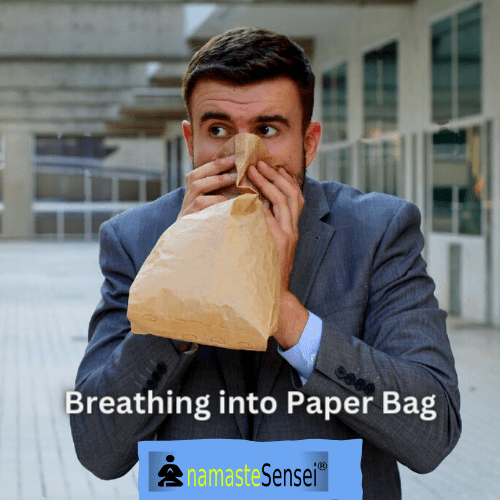
If a person is having an acute attack, their doctor may recommend breathing into a paper bag or using a relaxation technique like progressive muscle relaxation.
Betablockers & Antidepressants
Medications used to treat hyperventilation include beta-blockers and antidepressants. Beta-blockers help reduces the symptoms of anxiety, while antidepressants help balance the brain chemistry that causes it. Other treatments can include cognitive-behavioral therapy and hypnosis.
Lifestyle Changes
Lifestyle changes such as regular exercise, relaxation techniques, and stress management can also help relieve its symptoms. Avoiding triggers like caffeine, alcohol, and smoking can also be beneficial.
Breathing exercises, such as those taught in yoga and meditation, can also help regulate the body’s breathing patterns and reduce the frequency and intensity of hyperventilation episodes.
Prevention of hyperventilation
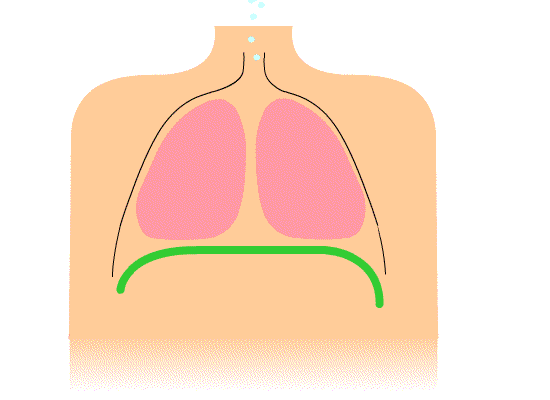
Hyperventilation and hypoventilation are two terms that are often used interchangeably, but they actually refer to two very different conditions. Hyperventilation is a condition where you are breathing too quickly or deeply, resulting in a decrease in carbon dioxide in the body. Hypoventilation, on the other hand, is when you don’t get enough oxygen into your body due to slow or shallow breathing.
Fortunately, it’s possible to prevent both conditions from occurring. Here are some tips for preventing hyperventilation:
-
Slow your breathing rate.
When feeling anxious, try to slow your breathing rate down to 8-10 breaths per minute. Take deep breaths and count for 4 seconds as you inhale and 4 seconds as you exhale.
-
Practice relaxation techniques.
Practice deep breathing exercises, meditation, and mindfulness activities to help control your breathing rate and reduce anxiety.
-
Avoid triggers.
Stay away from situations or activities that cause you to become anxious or stressed. If you know a certain activity may trigger your anxiety, make a plan to reduce the likelihood of experiencing hyperventilation during that time.
-
Monitor your breathing patterns.
If you notice you breathe more rapidly or shallowly, take a few deep breaths and focus on relaxing your body and mind. This will help regulate your breathing rate and prevent it.
By following these tips, you can help ensure that you don’t experience it. While it can be frightening, it is important to remember that it can be prevented with a few simple steps.
Recommended Read: What is Hypoventilation?
References
- Dyspnoea, hyperventilation and functional cough: a guide to which tests help sort them out. Click Here
-
Hyperventilation in Panic Disorder and Asthma: Empirical Evidence and Clinical Strategies. Click Here
Congratulations, you have read the complete article What Is Hyperventilation In BIology? If you have any doubts or queries, feel free to comment below. We will respond as soon as possible.
Or Email Us At [email protected]
Any topic you want us to cover? Let us know.
